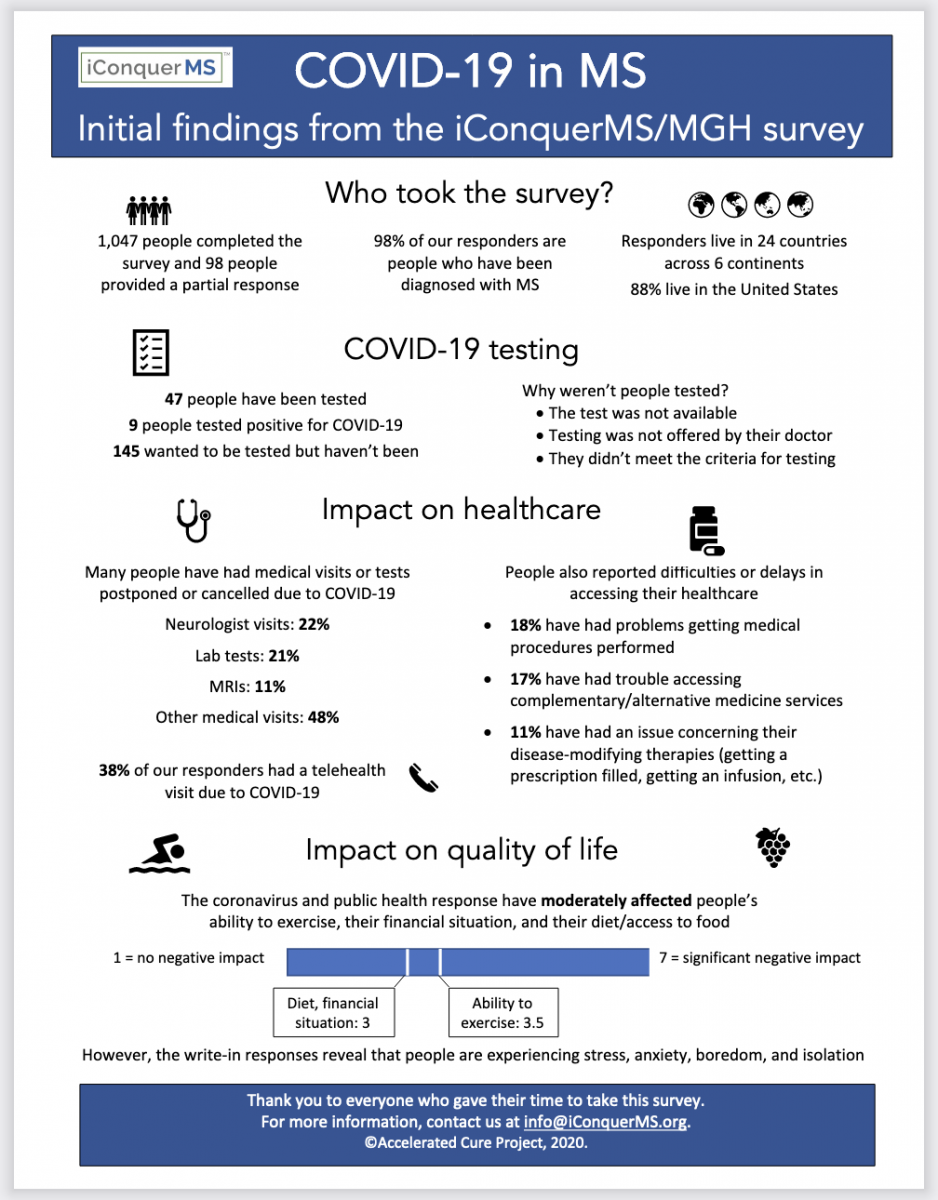What were the goals of this study?
-
To understand the health impact of COVID-19 on people with MS, including the effect of disruptions in treatment and health care access.
-
To understand the impact of the COVID-19 pandemic on depression, anxiety, and isolation for people with MS.
- To understand what people with MS know about COVID-19, their access to testing and treatment, and steps they were taking to avoid infection.
Who led the study and what was the funding source?
The study was led by Dr. Farrah Mateen of Massachusetts General Hospital and Harvard Medical School. Funding for the study was provided through an unrestricted grant from Biogen.
How was the study conducted?
iConquerMS members were invited to fill out two online surveys. The first was available beginning April 2020 and the second was available beginning December 2020. The surveys included questions on COVID-19 testing and infection, hospitalizations, symptoms, and concerns. Participants were also asked for information about MS symptoms, quality of life, attitudes toward vaccines, and characteristics such as age, type of MS, sex, and race/ethnicity. Just over 1,000 people completed each survey.
What did we learn from this study?
Key study findings include:
- At the beginning of the pandemic, a majority of people with MS reported interruptions to their regular MS care due to COVID-19 as well as limited access to COVID-19 testing.
- 10% reported changes to their normal MS treatment protocols
- Early in the pandemic, fewer than 1% reported a positive COVID-19 test, but more than half reported having symptoms
- Later in the pandemic, people with MS were about as likely as the general population to be infected with COVID-19.
- More than 75% of participants were willing to receive vaccines once they became available. Older individuals were more likely to want to get the vaccine while those with more disabilities were less likely. The greatest source of concern about the vaccines was safety.
- 27% of participants reported symptoms of depression and 15% reported experiencing anxiety. Those who were younger in age, who were female, or who had tested positive for COVID-19 were more likely to experience these effects.
What do these study findings mean?
These surveys tell us that COVID-19 has taken a significant toll on people with MS in terms of mental health and ability to maintain social connections. We also learned that the pandemic forced many people with MS to postpone medical care and disrupted MS treatment plans.
We also learned about the concerns and priorities of people with MS during the pandemic, including worry about being infected with COVID, concerns about activities associated with risk of exposure, and attitudes toward vaccination.
What will we do next with this information?
The results of the study have been published in a variety of formats (see below) to help inform education and treatment approaches, policies around access and health care delivery, and development of new research questions. iConquerMS has also used the results of these surveys when designing the COVER-MS study, our study of COVID-19 vaccinations in people with MS.
Learn more
Video: "Chat with Chat" interview with Dr. Farrah Mateen
Infographic: COVID-19 in MS PDF (118 KB)
Journal article (open-access): Impact of the COVID-19 pandemic on the health care of >1,000 people living with multiple sclerosis: A cross-sectional study
Journal article (open-access): COVID-19 vaccine hesitancy in multiple sclerosis: A cross-sectional survey
Journal article (open-access): Sociodemographic and clinical factors associated with depression, anxiety, and general mental health in people with multiple sclerosis during the COVID-19 pandemic
Abstract: Risk factors for COVID-19 infection in patients with multiple sclerosis: a nested case–control study
Share this project summary with others:
https://www.iconquerms.org/project-impact-COVID-MS